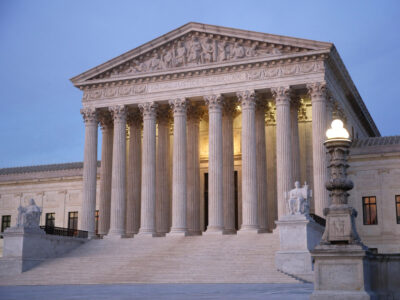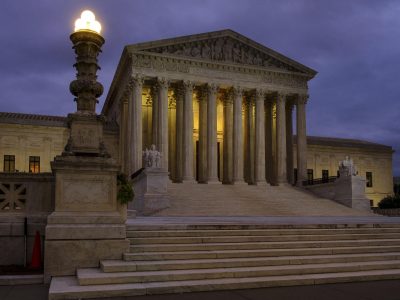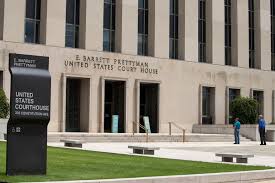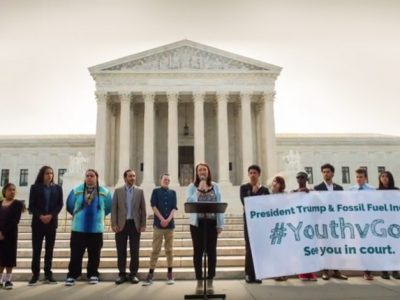standing
Mrs. Palsgraf, Meet Enviromental Law
A case involving a freakish accident with fireworks casts a big shadow in environmental law.
Today in my first-year Torts class, I teach the Palsgraf case, one of those cases that every lawyer knows by heart. More about Palsgraf in a moment. It’s a tort case, so it won’t surprise you that oil companies use similar arguments against having to pay damages for climate change. But it may be more …
Continue reading “Mrs. Palsgraf, Meet Enviromental Law”
CONTINUE READINGThe Case that Wouldn’t Die
The Juliana plaintiffs make a final effort to resurrect their case.
The district judge contemplates a wide-ranging trial about broad climate and energy policies, after which she would opine on their legality. The Supreme Court will likely think that putting an immense swathe of government policy on trial also violates the separation of powers — especially in a case where they are deeply skeptical of the underlying constitutional claim.
CONTINUE READINGState Government Standing and Environmental Law
The Supreme Court seems to be cooling to the idea of empowering state AGs.
Massachusetts v. EPA, the cornerstone climate case, contains an extensive discussion of standing which opens by saying that lawsuits by state governments are entitled to “special solicitude.” In the last few weeks of its term, the Supreme Court opined repeatedly on state standing. “Special solicitude” seems to be on the wane. Overall, I that might …
Continue reading “State Government Standing and Environmental Law”
CONTINUE READINGIndividuals Making a Difference
Two stories of the unknown environmental advocates behind major Supreme Court decisions.
My students often wonder whether they can actually make a difference. I like to tell them the story of Joe Mendelsohn. Mendelsohn, who worked at a tiny, obscure non-profit, decided that EPA needed to address climate change. His efforts, recounted in a book by Richard Lazarus, led to the Supreme Court’s blockbuster opinion in Massachusetts …
Continue reading “Individuals Making a Difference”
CONTINUE READINGUnprecedented Legal Questions
The climate crisis is unprecedented. So is its legal fallout.
In teaching my class on Climate Law, I’ve been struck by how many new legal questions courts are confronting as a result of the climate crisis. Dealing with these new legal questions is going to put stress on existing legal doctrines and require courts to rethink some basic principles. Unfortunately, the Supreme Court is pushing …
Continue reading “Unprecedented Legal Questions”
CONTINUE READINGSmoke But No Fire
No, the draft Supreme Court abortion decision doesn’t threaten the standing of environmental groups
The implications for environmental law are far from being the most important aspect of the leaked draft of a Supreme Court opinion overruling Roe v. Wade. The aggressiveness of the opinion in the Dobbs case signals a kind of activism that is definitely worrisome in other areas. At the end of last week, however, there …
Continue reading “Smoke But No Fire”
CONTINUE READING1990: The Year the Courts Discovered Climate Change
Cases were few, but one judge was years ahead of her time.
In an earlier post, I tried to figure out when the legal academy first discovered climate changes. As it turns out, it was almost a decade later when the federal courts took notice. Those first climate change cases shed light on how new issues get litigated and how courts respond to new science. My research …
Continue reading “1990: The Year the Courts Discovered Climate Change”
CONTINUE READINGGuest Contributors Matt Lifson, Camila Bustos, and Natasha Brunstein: Redressability of Climate Change Injuries after Juliana
Juliana Litigation’s Disappointing Result Leaves Room for Future Climate Plaintiffs to Allege Redressable Injuries
In the landmark Juliana litigation, the youth plaintiffs sought a judicial decree telling the federal government to develop and implement a plan to do its part to reduce atmospheric CO2 concentrations to 350 ppm. The Ninth Circuit dismissed Juliana, holding that the youth plaintiffs’ constitutional and public trust claims were not redressable by an Article …
CONTINUE READINGGuest Contributors Rosa Hayes and Samantha Peltz: Silver Linings in the 9th Circuit’s Juliana Decision
Juliana Litigation Provides Clues for Establishing Standing in Future Cases
For many aspiring environmental litigators, such as ourselves, the bold Juliana litigation was the little-case-that-could: it presented a novel constitutional theory to redress the climate crisis, survived a motion to dismiss against all odds, and went up to the Supreme Court not once, but twice. But on January 17, 2020, Juliana hit a significant roadblock …
CONTINUE READINGDeciding a Climate Case in the Shadow of the Supreme Court
Juliana Judges Surely Had The Higher Court in Mind in Drafting Their Decision
The irony of the Ninth Circuit decision dismissing the Juliana v. United States case this week is plain to see. Two branches of government — the legislative and executive – have failed to act to address an environmental problem that may cause the destruction of the federal government itself. The third branch, the judiciary, recognizes the …
Continue reading “Deciding a Climate Case in the Shadow of the Supreme Court”
CONTINUE READING












